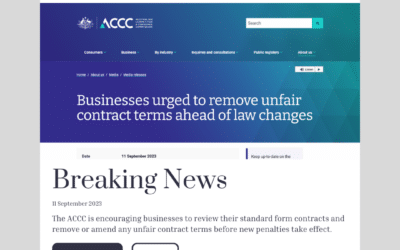November 24, 2023
A Shifting Legal Landscape
Today’s businesses are under constant threat from cyber attacks, making it increasingly important to understand how they can legally protect their private conversations. Legal professional privilege is a fundamental rule that keeps the sensitive dialogue between companies and their lawyers confidential. In the fast paced digital world, the challenge is to maintain this confidentiality amidst cyber threats that didn’t exist when these rules were made. The legal field is evolving, trying to find the balance between keeping information safe in the cyber realm and upholding the privacy of legal conversations.
The case of Optus, a major player in Australian telecommunications, brought these issues into the spotlight. When Optus was hit by a major cyber attack, it wasn’t just a problem for their IT department, it also became a legal puzzle. This incident has become a key example in understanding the role of legal privilege when it comes to cyber incidents. The legal decisions made here, have set new standards that will influence many cases to come.
The Optus Case: A Landmark Ruling
When Robertson v Singtel Optus Pty Ltd came before the court in 2023, it was a defining moment for legal rules in the digital age. Back in September 2022, Optus was hit by a massive cyberattack, putting its customers’ personal information at risk. This incident didn’t just cause widespread concern in the tech world, it also sparked a demand for Optus to take responsibility and fix the damage.
To get to the bottom of this cyber crisis, Optus hired Deloitte to perform a thorough investigation. Deloitte was tasked with figuring out how the attack happened and how Optus could strengthen its defences for the future. This investigation became a legal focal point when affected customers filed a class action against Optus in April 2023. A central legal issue was whether Deloitte’s investigative report was protected by legal privilege. In a significant decision by Justice Beach in November 2023, the court determined that the Deloitte report was not exclusively protected by legal privilege. The rationale was that the report’s purpose extended beyond seeking legal advice, it was also intended to analyse the cyberattack and bolster Optus’s security protocols. This judgment served as an important reminder of the challenges in safeguarding confidential legal communications in the digital era, especially when a document serves multiple objectives.
Understanding Legal Professional Privilege
Legal professional privilege is like a protective bubble around conversations between lawyers and their clients. It’s a rule that keeps these talks secret, so clients can speak freely about their legal troubles without worrying that their words will be used against them later in court. This privilege is crucial, especially when companies are dealing with complex issues like cyberattacks.
In the business world, this protection is even more critical. Companies often find themselves in a maze of legal rules and need to talk things out with their lawyers candidly to navigate them. This could be about merging with another company, following laws, or handling a crisis like a cyber breach. The promise that their discussions will stay private is key to getting honest and effective advice.
This privilege isn’t just about conversations, it covers all sorts of communications, like emails, meeting notes, and even reports made by or for legal counsel. But there’s a catch: to be protected, these exchanges must be aimed at getting legal advice. That’s where things get tricky. In today’s world, where a single document might serve many purposes, like a business plan and legal advice, deciding what’s protected can be complex.
It’s important to know that this privilege has its limits. There are rules about when it can be used, and courts can question it, like what happened in the Optus case. If a document is made for reasons other than legal advice, say, for business planning or public relations, then it might not be kept secret under this privilege. That’s why companies and their legal teams have to be very thoughtful about how they talk about and document their legal advice.
The Court’s View on Keeping Communications Confidential
The decision by Justice Beach J was a turning point in how the law looks at keeping certain communications private, especially when it comes to cyberattacks. He zoomed in on what’s known as the ‘dominant purpose test’ this is like a measuring stick used to figure out if the main reason for a report or conversation was to get legal advice.
In the situation with Optus, Justice Beach found that the report made by Deloitte was not just for legal insights. It was also created to dig into the cyberattack details and to check on how well Optus was guarding against hackers. So, the court said that the report didn’t pass the test, it wasn’t made mainly for legal advice. This judgment is now a reference point for future decisions about when communications can be kept private under the law.
How Outside Experts Fit into Legal Confidentiality
The Optus case put the spotlight on the complicated role that outside experts, like Deloitte, play in legal matters. Businesses often hire these experts for their deep knowledge in specialised fields such as cybersecurity. But when these external experts get involved, figuring out what information stays confidential, legally protected gets tricky.
What these consultants discover, the reports they write, and the advice they give can be very important when a business is dealing with legal issues, like a legal proceeding or government investigation. The Optus case showed that companies need to be very careful about how they use these experts. To keep their work protected as legal advice, everything from the reasons they’re hired to how they report their findings needs to be handled with care.
Public Statements and Leadership Choices
What stood out in the Optus case was how the company’s public announcements and top level decisions influenced the legal outcome. The information Optus shared with the public after the breach, and the steps its leaders took to bring in Deloitte, were key factors for the court.
Justice Beach J. looked closely at these actions to figure out why Deloitte was hired. Optus’s announcements, which focused on understanding what went wrong and how to stop it from happening again, along with the official decisions made by the company’s board, pointed to a goal that went beyond just getting legal advice. This reminds us that being clear and consistent in what companies say and document is vital for protecting the privacy of their legal discussions.
Conclusion: Steering Through Cybersecurity and Legal Challenges
The Optus case is a treasure trove of insights for mastering the complex dance between cybersecurity and keeping legal talks private. It’s a real life example of how the rules for legal confidentiality are changing in our online world. This case emphasises the importance of having a smart legal game plan and being precise in how companies communicate during a cyber crisis. As technology advances, the laws do too, and businesses need to keep up, making sure their cyber crisis plans are as legally solid as they are tech savvy. Learning from the Optus experience, companies can better prepare to deal with cyber troubles while preserving the secrecy of their legal conversations.
FAQs:
What is legal professional privilege when it comes to cyber problems? It’s the rule that allows companies to talk about cyberattack issues with their lawyers in private, knowing those talks won’t be shared in court. It’s vital for open and honest communication following a cyber incident.
What did the court say about this privilege in the Optus cyberattack case? In the Optus case, the court used the ‘main reason test’ to see if the report from Deloitte was mostly for legal advice or something else. They decided it wasn’t just for legal advice because it also looked into how the cyberattack happened and Optus’s security measures. So, it wasn’t covered by this privilege.
How important are outside experts in keeping these communications private? Experts like Deloitte are key in dealing with cyber crises because of their specialised knowledge. But to keep their work private, companies must be clear that they hired these experts mostly for legal advice and make sure all their interactions reflect that.
How do companies keep their communications protected by this privilege? Businesses can protect their conversations by:
- Clearly stating they’re seeking legal advice when they bring experts on board.
- Labelling all related talks and documents as private and for legal eyes only.
- Making sure they don’t give mixed signals in their public and private comments about why they’re doing certain investigations or creating reports.
What can we learn from Optus about dealing with future cyber issues? From the Optus case, companies should:
- Get legal help early on in a cyber crisis.
- Be precise about why they’re hiring experts and what they’re communicating.
- Keep their public statements and internal messages consistent to back up their claims for privacy.
Disclaimer
The material contained in this publication is of a general nature only and it is not, nor is intended to be, legal advice.
🖤💛❤️
AMK Law acknowledges the Traditional Owners of the land on which we are fortunate to live and work. We pay our respects to Elders, both past and present and further acknowledge the important role that Indigenous people continue to play within our communities.

Book Your Appointment
Related Articles
Ticketek’s $500K Fine: A Legal Perspective on Email Compliance
In the constantly changing world of digital communication, email marketing remains a vital way for businesses to connect with their audience. However, it's crucial to manage this tool with care and attention to legal obligations. The Australian Communications and...
Navigating the Waters of Unfair Contract Terms in Australia
As a small business owner in Australia, you might have come across the recent updates to the Australian Consumer Law regarding unfair contract terms. If it seems a bit complex, don't worry! We're here to simplify it for you in clear terms. Unfair Contract...
Aboriginal Cultural Heritage Act 2021: A New Era
Transforming Heritage Protection in Western Australia: Honouring the Custodians of Aboriginal Land Australia's vast landscape has always been, and will always remain, Aboriginal land. It's a living testament to a rich history that's been shaped and nurtured by...




